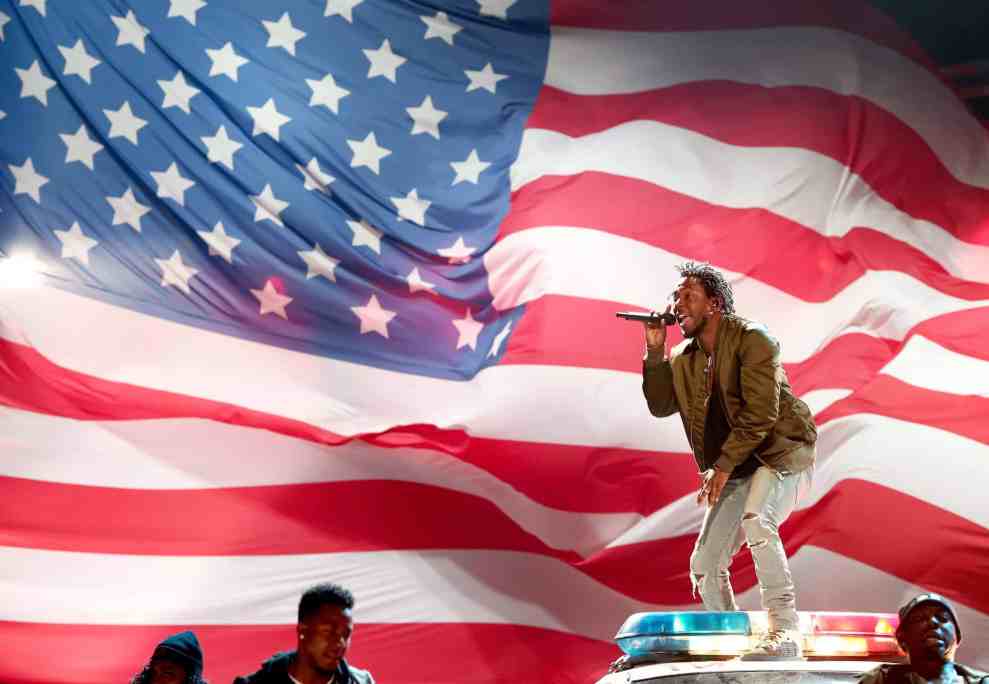(Photo by Christopher Polk/BET/Getty Images and David Fenton/Getty Images)
‘Black Panther’ director, Ryan Coogler, reached out to Kendrick who said in a press release, “I am honored to be working with such an incredible artist whose work has been so inspirational, and whose artistic themes align with those we explore in the film. I can’t wait for the world to hear what Kendrick and TDE have in store.”
This collaboration has historical significance beyond pairing Kendrick’s poetic lyrics, known for their social and political commentary, with a film whose subject is timely and politically charged. Although the comic book character does not derive from the Black Panther Party of the 1960s, the character himself echoes the values of social justice.
Founded by Bobby Seale and Huey Newton in 1966, the Black Panther Party (BPP) revolutionized the fight for equal rights in the United States. Initially, the party was formed to respond to the overwhelming amount of police brutality incidents in Oakland, California.
During the revolution, the BPP were often pitted against Martin Luther King Jr. as a “threat” to the government and the people. However, the Panthers simply believed Martin Luther King Jr.’s methods towards equality were moving too slow. The BPP upheld their civil right to self-defense, using the same force that police used, to defend minorities.
Through volunteer-based programs, the BPP stressed the importance of properly educating black youth to be aware of the accurate history of their people. They saw the value in building a fortified community, pushing for an accurate portrayal of black history in America and reclaiming an identity that was controlled and scripted by the majority. This movement was growing rapidly, having gained its momentum originally in the Bay Area, eventually spreading to major cities such as, Los Angeles, Chicago, and New York City.

Social injustices traditionally dismissed by the United States government, such as a food injustice among black children, were tackled by creating the Free Breakfast for Children Program in low-income public schools. The program asserted that food was a necessary fuel required to positively affect a child’s academic capacity during the school day. Years later, the federal government implemented the original food-in-schools initiative as their own in an attempt to derail the BPP by not giving them credit for the initial concept.
The BPP did not last, falling apart in the early 1970s citing legal problems, felony assaults, and internal struggles. The Party raised the consciousness of a community by revolutionizing a platform that was spoken of in clandestine gatherings among family and friends or touched upon in barbershops, churches and juice joints. The Party lifted the shroud and turned up the volume on the issues that perpetuated institutionalized injustice for everyone to hear.
In today’s hip-hop scene, Kendrick Lamar uses his mic to elevate the voice of the marginalized. The Compton-based lyricist has separated himself from other artists by using his platform to speak on behalf of the disenfranchised, while still appealing to a mainstream audience. Kendrick has successfully struck the balance between reaching the black community, as well as appealing to the mainstream audience.
With numerous incidents involving police brutality continuing to occur, there are striking similarities between the BPP’s mission and Kendrick’s audience. Although the BPP’s legacy of showcasing what resistance to unjust treatment looked and felt like and Kendrick’s lyrics confront these same issues, the genius found in Kendrick’s lyrics and beats reach a wider audience with a wider platform for change.
The BPP was seen as a threat to society and faced resistance at all turns and yet, Kendrick’s lyrics, filled with the underbelly of a people who just need to get along, are widely accepted. His lyrics have become a catalyst for a dialogue inviting people from both sides of the table to find commonality and develop solutions to end violence. In an interview with Complex Kendrick said, “I got a greater purpose, God put something in my heart to get across and that’s what I’m going to focus on, using my voice as an instrument and doing what needs to be done.”
Kendrick and TDE, attesting to the BPP’s struggle to be heard and to attain equality, are using their talent to represent those whose voices have continually been overlooked.
Listen to the single below:

